直接英语与间接引语
- 格式:doc
- 大小:40.00 KB
- 文档页数:7
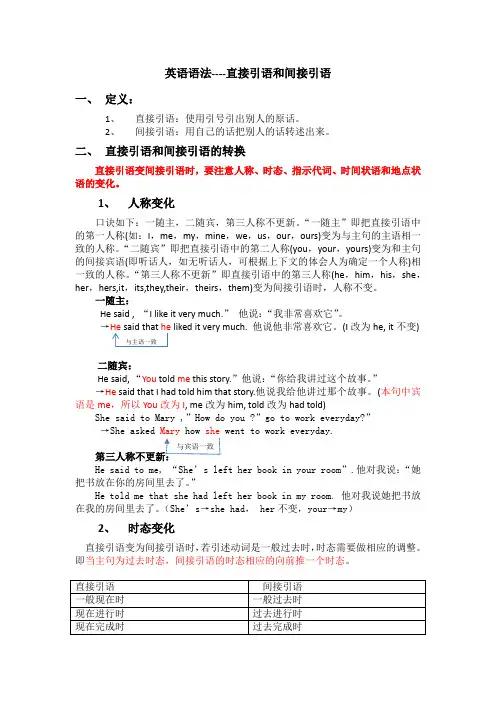
英语语法----直接引语和间接引语一、 定义:1、 直接引语:使用引号引出别人的原话。
2、间接引语:用自己的话把别人的话转述出来。
二、 直接引语和间接引语的转换直接引语变间接引语时,要注意人称、时态、指示代词、时间状语和地点状语的变化。
1、 人称变化口诀如下:一随主,二随宾,第三人称不更新。
“一随主”即把直接引语中的第一人称(如:I ,me ,my ,mine ,we ,us ,our ,ours)变为与主句的主语相一致的人称。
“二随宾”即把直接引语中的第二人称(you ,your ,yours)变为和主句的间接宾语(即听话人,如无听话人,可根据上下文的体会人为确定一个人称)相一致的人称。
“第三人称不更新”即直接引语中的第三人称(he ,him ,his ,she ,her ,hers,it ,its,they,their ,theirs ,them)变为间接引语时,人称不变。
一随主:He said , “I like it very much.” 他说:“我非常喜欢它”。
→liked it very much. 他说他非常喜欢它。
(I 改为he, it 不变)二随宾:He said, “You told me this story.”他说:“你给我讲过这个故事。
”→He said that I had told him that story.他说我给他讲过那个故事。
(本句中宾语是me ,所以You 改为I , me 改为him, told 改为had told)She said to Mary ,”How do you ?”go to work everyday?” →She asked Mary how she went to work everyday. 第三人称不更新:He said to me, “She’s left her book in your room ”.他对我说:“她把书放在你的房间里去了。

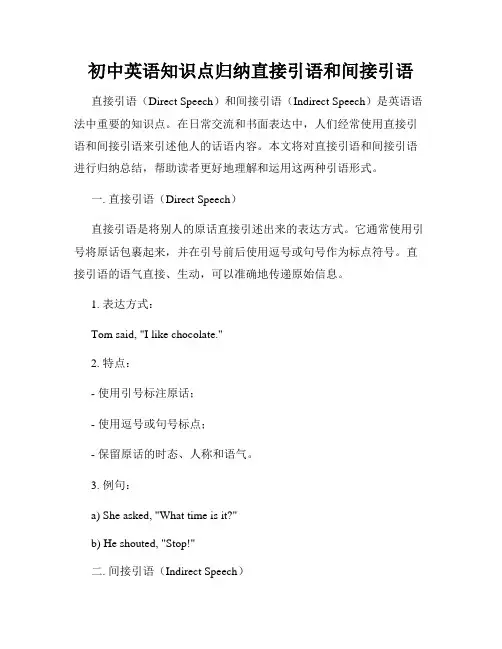
初中英语知识点归纳直接引语和间接引语直接引语(Direct Speech)和间接引语(Indirect Speech)是英语语法中重要的知识点。
在日常交流和书面表达中,人们经常使用直接引语和间接引语来引述他人的话语内容。
本文将对直接引语和间接引语进行归纳总结,帮助读者更好地理解和运用这两种引语形式。
一. 直接引语(Direct Speech)直接引语是将别人的原话直接引述出来的表达方式。
它通常使用引号将原话包裹起来,并在引号前后使用逗号或句号作为标点符号。
直接引语的语气直接、生动,可以准确地传递原始信息。
1. 表达方式:Tom said, "I like chocolate."2. 特点:- 使用引号标注原话;- 使用逗号或句号标点;- 保留原话的时态、人称和语气。
3. 例句:a) She asked, "What time is it?"b) He shouted, "Stop!"二. 间接引语(Indirect Speech)间接引语是将别人的话转述成自己的话的表达方式,同时改变动词的时态、人称以及其他相关的语言表达手法。
与直接引语相比,间接引语更加客观,不再保留原始语气和说话者的个人情感。
1. 表达方式:Tom said that he liked chocolate.2. 特点:- 去除引号,没有标点符号的限制;- 改变动词的时态、人称和语气;- 可能需要改变疑问句的语序。
3. 例句:a) She asked what time it was.b) He shouted to stop.三. 直接引语转换为间接引语的规则1. 时态转换:- 一般现在时变为一般过去时;- 现在进行时变为过去进行时;- 一般过去时变为过去完成时;- 现在完成时变为过去完成时;- 将来时变为将来过去时。
2. 人称变化:- 第一人称变为第三人称;- 第二人称不变化;- 第三人称根据实际情况变化。
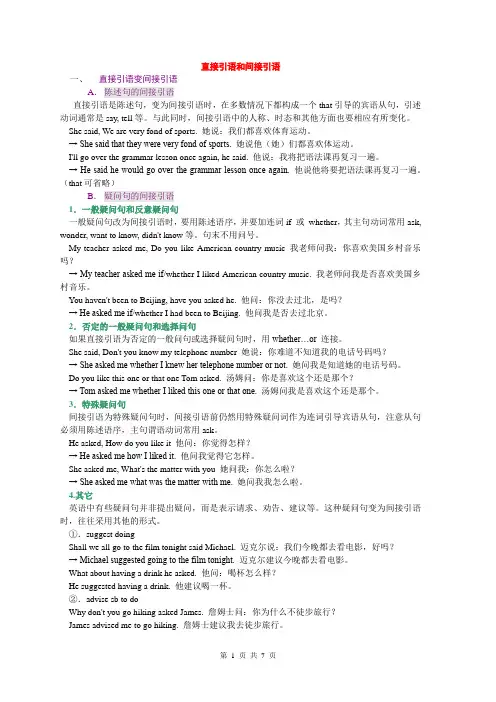
直接引语和间接引语一、直接引语变间接引语A.陈述句的间接引语直接引语是陈述句,变为间接引语时,在多数情况下都构成一个that引导的宾语从句,引述动词通常是say, tell等。
与此同时,间接引语中的人称、时态和其他方面也要相应有所变化。
She said, We are very fond of sports. 她说:我们都喜欢体育运动。
→ She said that they were very fond of sports. 她说他(她)们都喜欢体运动。
I'll go over the grammar lesson once again, he said. 他说:我将把语法课再复习一遍。
→ He said he would go over the grammar lesson once again. 他说他将要把语法课再复习一遍。
(that可省略)B.疑问句的间接引语1.一般疑问句和反意疑问句一般疑问句改为间接引语时,要用陈述语序,并要加连词if 或whether,其主句动词常用ask, wonder, want to know, didn't know等。
句末不用问号。
My teacher asked me, Do you like American country music 我老师问我:你喜欢美国乡村音乐吗?→ My teacher asked me if/whether I liked American country music. 我老师问我是否喜欢美国乡村音乐。
You haven't been to Beijing, have you asked he. 他问:你没去过北,是吗?→ He asked me if/whether I had been to Beijing. 他问我是否去过北京。
2.否定的一般疑问句和选择问句如果直接引语为否定的一般问句或选择疑问句时,用whether…or 连接。
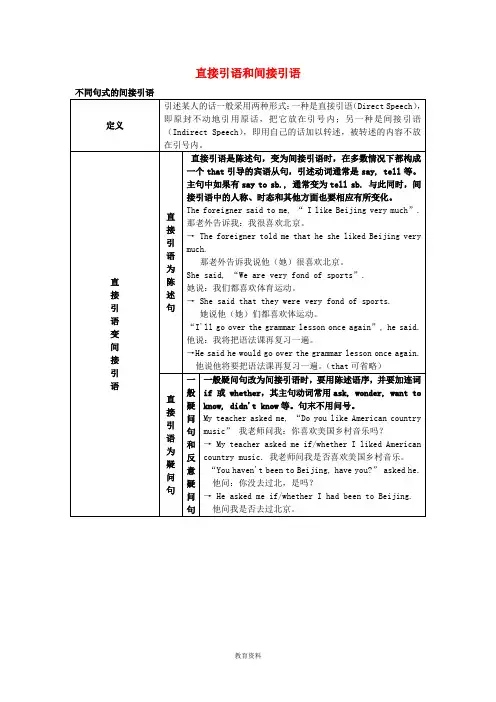
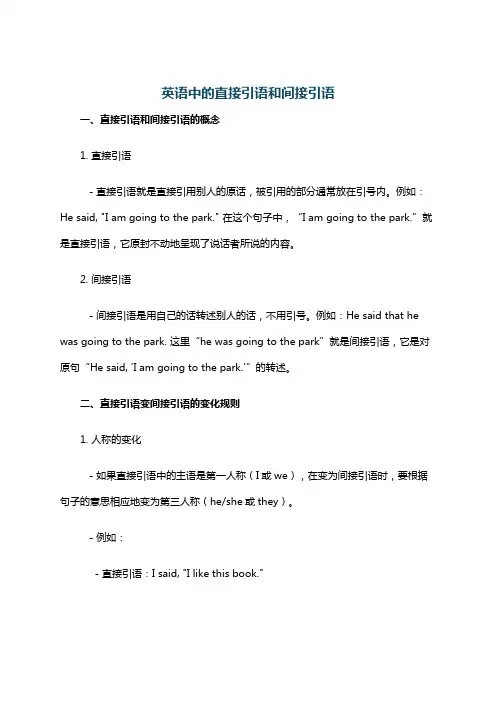
英语中的直接引语和间接引语一、直接引语和间接引语的概念1. 直接引语- 直接引语就是直接引用别人的原话,被引用的部分通常放在引号内。
例如:He said, "I am going to the park." 在这个句子中,“I am going to the park.”就是直接引语,它原封不动地呈现了说话者所说的内容。
2. 间接引语- 间接引语是用自己的话转述别人的话,不用引号。
例如:He said that he was going to the park. 这里“he was going to the park”就是间接引语,它是对原句“He said, 'I am going to the park.'”的转述。
二、直接引语变间接引语的变化规则1. 人称的变化- 如果直接引语中的主语是第一人称(I或we),在变为间接引语时,要根据句子的意思相应地变为第三人称(he/she或they)。
- 例如:- 直接引语:I said, "I like this book."- 间接引语:I said that I liked this book.(这里因为主语都是I,人称不变,但如果是He said, "I like this book." 变为间接引语就是He said that he liked this book.)- 如果直接引语中的第二人称(you),在变为间接引语时,要根据转述者和听话者的关系变为第一人称(I/we)或第三人称(he/she/they)。
- 例如:- 直接引语:He said to me, "You are a good student."- 间接引语:He told me that I was a good student.- 直接引语:He said to her, "You should study hard."- 间接引语:He told her that she should study hard.2. 时态的变化- 一般现在时变为一般过去时。
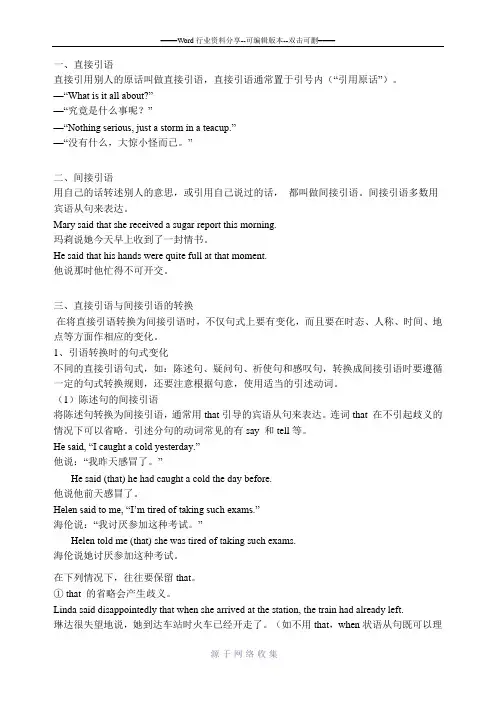
一、直接引语直接引用别人的原话叫做直接引语,直接引语通常置于引号内(“引用原话”)。
—“What is it all about?”—“究竟是什么事呢?”—“Nothing serious, just a storm in a teacup.”—“没有什么,大惊小怪而已。
”二、间接引语用自己的话转述别人的意思,或引用自己说过的话,都叫做间接引语。
间接引语多数用宾语从句来表达。
Mary said that she received a sugar report this morning.玛莉说她今天早上收到了一封情书。
He said that his hands were quite full at that moment.他说那时他忙得不可开交。
三、直接引语与间接引语的转换在将直接引语转换为间接引语时,不仅句式上要有变化,而且要在时态、人称、时间、地点等方面作相应的变化。
1、引语转换时的句式变化不同的直接引语句式,如:陈述句、疑问句、祈使句和感叹句,转换成间接引语时要遵循一定的句式转换规则,还要注意根据句意,使用适当的引述动词。
(1)陈述句的间接引语将陈述句转换为间接引语,通常用that引导的宾语从句来表达。
连词that 在不引起歧义的情况下可以省略。
引述分句的动词常见的有say 和tell等。
He said, “I caught a cold yesterday.”他说:“我昨天感冒了。
”He said (that) he had caught a cold the day before.他说他前天感冒了。
Helen said to me, “I’m tired of taking such exams.”海伦说:“我讨厌参加这种考试。
”Helen told me (that) she was tired of taking such exams.海伦说她讨厌参加这种考试。
在下列情况下,往往要保留that。
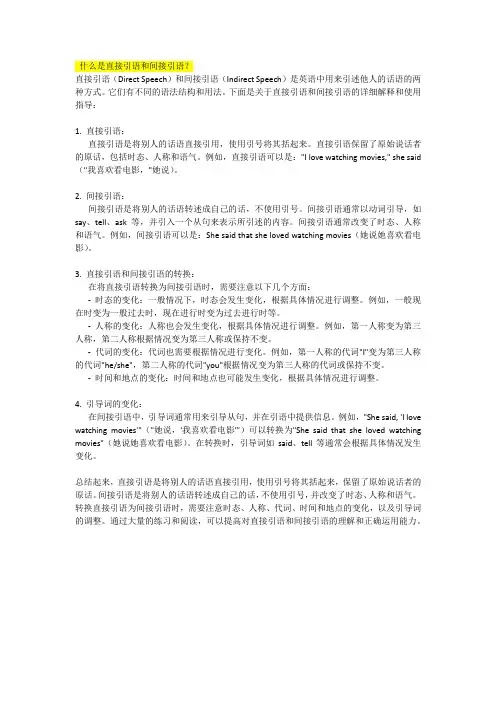
什么是直接引语和间接引语?直接引语(Direct Speech)和间接引语(Indirect Speech)是英语中用来引述他人的话语的两种方式。
它们有不同的语法结构和用法。
下面是关于直接引语和间接引语的详细解释和使用指导:1. 直接引语:直接引语是将别人的话语直接引用,使用引号将其括起来。
直接引语保留了原始说话者的原话,包括时态、人称和语气。
例如,直接引语可以是:"I love watching movies," she said ("我喜欢看电影,"她说)。
2. 间接引语:间接引语是将别人的话语转述成自己的话,不使用引号。
间接引语通常以动词引导,如say、tell、ask等,并引入一个从句来表示所引述的内容。
间接引语通常改变了时态、人称和语气。
例如,间接引语可以是:She said that she loved watching movies(她说她喜欢看电影)。
3. 直接引语和间接引语的转换:在将直接引语转换为间接引语时,需要注意以下几个方面:-时态的变化:一般情况下,时态会发生变化,根据具体情况进行调整。
例如,一般现在时变为一般过去时,现在进行时变为过去进行时等。
-人称的变化:人称也会发生变化,根据具体情况进行调整。
例如,第一人称变为第三人称,第二人称根据情况变为第三人称或保持不变。
-代词的变化:代词也需要根据情况进行变化。
例如,第一人称的代词"I"变为第三人称的代词"he/she",第二人称的代词"you"根据情况变为第三人称的代词或保持不变。
-时间和地点的变化:时间和地点也可能发生变化,根据具体情况进行调整。
4. 引导词的变化:在间接引语中,引导词通常用来引导从句,并在引语中提供信息。
例如,"She said, 'I love watching movies'"("她说,'我喜欢看电影'")可以转换为"She said that she loved watching movies"(她说她喜欢看电影)。
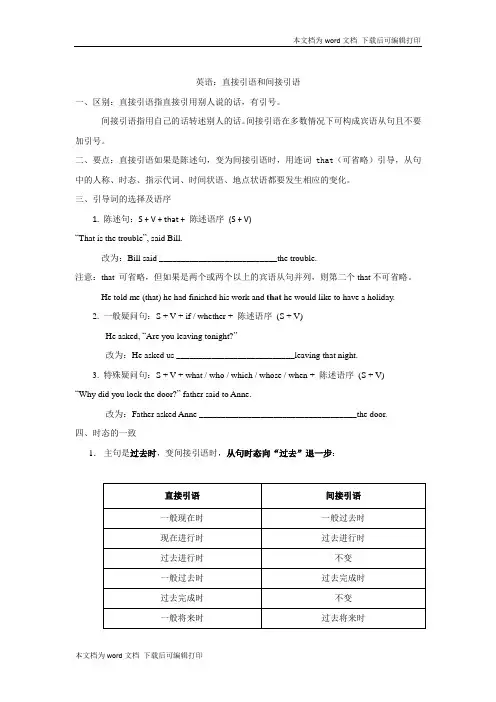
英语:直接引语和间接引语一、区别:直接引语指直接引用别人说的话,有引号。
间接引语指用自己的话转述别人的话。
间接引语在多数情况下可构成宾语从句且不要加引号。
二、要点:直接引语如果是陈述句,变为间接引语时,用连词that(可省略)引导,从句中的人称、时态、指示代词、时间状语、地点状语都要发生相应的变化。
三、引导词的选择及语序1. 陈述句:S + V + that + 陈述语序(S + V)“That is the trouble”, said Bill.改为:Bill said ___________________________the trouble.注意:that 可省略,但如果是两个或两个以上的宾语从句并列,则第二个that不可省略。
He told me (that) he had finished his work and that he would like to have a holiday.2. 一般疑问句:S + V + if / whether + 陈述语序(S + V)He asked, “Are you leaving tonight?”改为:He asked us ___________________________leaving that night.3. 特殊疑问句:S + V + what / who / which / whose / when + 陈述语序(S + V)“Why did you lock the door?” father said to Anne.改为:Father asked Anne ____________________________________the door.四、时态的一致1.主句是过去时,变间接引语时,从句时态向“过去”退一步:2.直接引语是客观真理时,变成间接引语时时态不变:The teacher said, “The earth goes round the sun.”改为:The teacher _________ _________ _________ _________ noise in the library.3. 直接引语中有明确表示过去时间状语的,变成间接引语时时态不变:Wei Fang said, “I was born in 1994.”改为:Wei Fang said _________ _________ _________ born in 1994.4.直接引语前面的主句谓语是现在时态,变间接引语时,时态不变:He says, “I have been married for 3 years.”改为:He said that _________ _________ _________ _________ for 3 years.五、人称及状语的变化1.人称变化:“一主二宾三不变”(直接引语中若出现第一人称则看主句主语,第二人称看主句宾语,第三人称无须变)试观察:She said to him, “I am very hungry.”改为:She told him that she was very hungry.She said to him, “You are very nice.”改为:She told him that he was very nice.She said to him, “Lily is very nice.”改为:She told him that Lily was very nice.2.状语与限定词变化:“这这那那,来来去去”。
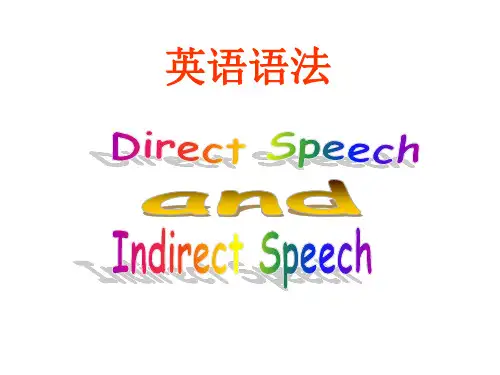
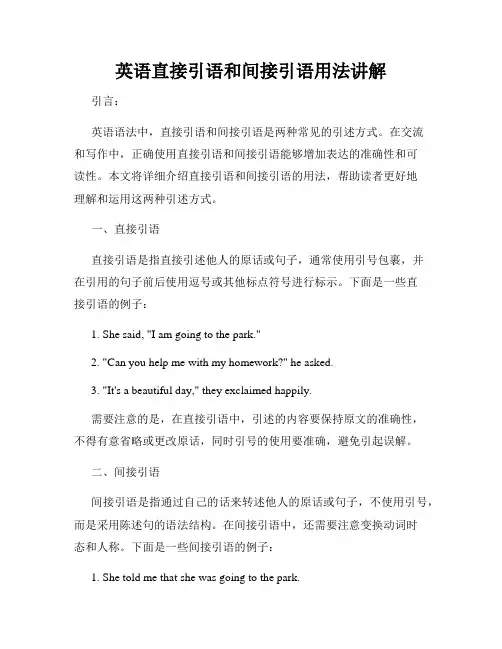
英语直接引语和间接引语用法讲解引言:英语语法中,直接引语和间接引语是两种常见的引述方式。
在交流和写作中,正确使用直接引语和间接引语能够增加表达的准确性和可读性。
本文将详细介绍直接引语和间接引语的用法,帮助读者更好地理解和运用这两种引述方式。
一、直接引语直接引语是指直接引述他人的原话或句子,通常使用引号包裹,并在引用的句子前后使用逗号或其他标点符号进行标示。
下面是一些直接引语的例子:1. She said, "I am going to the park."2. "Can you help me with my homework?" he asked.3. "It's a beautiful day," they exclaimed happily.需要注意的是,在直接引语中,引述的内容要保持原文的准确性,不得有意省略或更改原话,同时引号的使用要准确,避免引起误解。
二、间接引语间接引语是指通过自己的话来转述他人的原话或句子,不使用引号,而是采用陈述句的语法结构。
在间接引语中,还需要注意变换动词时态和人称。
下面是一些间接引语的例子:1. She told me that she was going to the park.2. He asked if I could help him with his homework.3. They said happily that it was a beautiful day.在转述他人的原话时,要准确地传递原文的意思,避免产生歧义和误解。
此外,在使用间接引语时,还要注意一下几点:1. 当直接引语中有时态或人称变化时,需要将其调整为合适的变化形式。
例如,“I am going” 转述为“she was going”,“Can you help me?” 转述为“he asked if I could help him”。
英语语法直接引语和间接引语集团标准化工作小组 [Q8QX9QT-X8QQB8Q8-NQ8QJ8-M8QMN]英语语法----直接引语和间接引语一、定义:1、直接引语:使用引号引出别人的原话。
2、间接引语:用自己的话把别人的话转述出来。
二、直接引语和间接引语的转换直接引语变间接引语时,要注意人称、时态、指示代词、时间状语和地点状语的变化。
1、人称变化口诀如下:一随主,二随宾,第三人称不更新。
“一随主”即把直接引语中的第一人称(如:I,me,my,mine,we,us,our,ours)变为与主句的主语相一致的人称。
“二随宾”即把直接引语中的第二人称(you,your,yours)变为和主句的间接宾语(即听话人,如无听话人,可根据上下文的体会人为确定一个人称)相一致的人称。
“第三人称不更新”即直接引语中的第三人称(he,him,his,she,her,hers,it,its,they,their,theirs,them)变为间接引语时,人称不变。
一随主:He said , “I like it very much.”他说:“我非常喜欢它”。
→He said that he liked it very much. 他说他非常喜欢它。
(I改为he, it不变)与主语一致二随宾:He?said,?“You?told?me?this?story.”他说:“你给我讲过这个故事。
”??→He?said?that?I?had?told?him?that?story.他说我给他讲过那个故事。
(本句中宾语是me,所以You改为I,?me改为him,?told改为had?told)?She said to Mary ,”How do you ?”go to work everyday?”→She asked Mary how she went to work everyday.与宾语一致第三人称不更新:He said to me, “She’s left her book in your room”.他对我说:“她把书放在你的房间里去了。
英语直接引语与间接引语直接引语和间接引语是英语中常见的引述他人说话或思想的方式。
在书写中,我们需要了解如何正确地使用和引用直接引语和间接引语。
以下是关于英语直接引语和间接引语的详细介绍。
一、直接引语直接引语是将原话使用引号直接援引出来并照原样呈现的方式。
在引用直接引语时,需要使用适当的标点符号、引号和动词。
例如:1. 她说:“我很喜欢这本书。
”2. “你什么时候回来?”他问道。
3. “我会帮助你的。
”他向我保证道。
在直接引语中,引号需要紧贴引文,句号或其他标点符号则放在引号之内。
动词通常在引语之后的逗号或冒号之前使用。
需要注意的是,当某人的原话跨越多个段落时,只需要在首次引用时使用引号,其他段落之前不再使用引号。
二、间接引语间接引语是通过转述或改写原话的方式来引述他人的说话或思想。
在间接引语中,不需要使用引号,而是通过动词的变化来呈现原话。
例如:1. 她说她很喜欢那本书。
2. 他问我什么时候回来。
3. 他向我保证会帮助我。
在使用间接引语时,需要将原话改写成陈述句,并修改人称和动词的时态,以适应引述者的身份。
对于引述他人的提问,需要将原问句改写成陈述句。
需要注意的是,间接引语中不需要使用句号或其他标点符号。
三、引用动词在使用直接引语或间接引语时,我们需要使用适当的引用动词。
以下是常见的引用动词:1. 说(said)例如:“我很喜欢这本书。
”她说道。
2. 问(asked)例如:“你什么时候回来?”他问道。
3. 回答(answered)例如:“我会帮助你的。
”他回答道。
4. 告诉(told)例如:“明天会下雨。
”他告诉我。
5. 表示(expressed)例如:“我对这个决定感到满意。
”她表示。
需要根据具体情境选择合适的引用动词,并根据时态和人称进行变化。
总结:英语直接引语和间接引语是引述他人说话或思想的两种常见方式。
在使用直接引语时,需要使用引号和适当的标点符号,并在引语之后使用适当的动词。
而在使用间接引语时,需要将原话改写成陈述句,并通过动词的变化来呈现原话。
直接引语和间接引语当我们引用别人的话时,我们可以用别人的原话,也可以用自己的话把意思转述出来,如果是引用原画,被引用的部分就称为直接引语(Direct Speech),否则称为间接引语(Indirect Speech)e.g.直接引语:John said: “I’m busy.”间接引语:John said that he was busy.直接引语通常用引号(“”)括起来,间接引语在多数情况下都构成一个宾语从句。
如果引用的句子原来是一个陈述句,在间接引语中我们就要注意下面几点:1.在引语的开头用练习that:He said, “Mother, the boy is very naughty.”He told his mother that the boy was very naughty.2.根据意思改变人称:He said (to me), “I have left my book in your room.”He told me that he had left his book in my room.She said (to me), “Your pronunciation is better than mine. ”She said that my pronunciation was better than hers.3.注意引语中的谓语与句子主要谓语在时态上的一致:She said, “I need some money.”She said that she needed some money.Amy said, “I will call you again.”Amy said that she would call me again.Mary said, “We have got two first places in the sports meet.”Mary said that they had got two first places in the sports meet.4.根据意思将指示代词、地点及时间状语等作必要的更改:She said, “I will come here again tonight.”She said that she would go there again that night.He said, “I arrived yesterday morning.”He said that he had arrived the morning before.She said, “My sister will be back tomorrow evening.”She said (that) her sister would be back the following evening.一般来讲,here改为there,today改为that day等。
直接引语和间接引语作者:叶文斌二、直接引语变间接引语的时态规律五、不同类型的直接引语变为间接引语的规律Grammar Work[语法专练]1.将下面的直接引语改为间接引语a. Aunt Emily said to me, “I will take your daughter to the history museum tomorrow.”____________________________________________________________________________ b. Tom asked, “Do you have the habit of having sports every day?”____________________________________________________________________________ c. My sister asked me, “When did you find the answer to this question?”____________________________________________________________________________ d. “My workers are trying to finish this task ahead of time,” the engineer said to us.____________________________________________________________________________ e. Mr. Smith said to us, “Don’t be late for school tomorrow, please.”____________________________________________________________________________ 2.将下面的间接引语改为直接引语a. The teacher asked us who could solve that difficult question.____________________________________________________________________________ b. The traveler said that everything had changed since he came last time.____________________________________________________________________________ c. The old man order his grandsons to be quiet.____________________________________________________________________________ d. He said that his parents should have been there three days before, but they were not there then. ____________________________________________________________________________ e. The interviewee asked me when I was born.____________________________________________________________________________Grammar Quiz[语法小测]1. Little brother asked me _____ I could buy him a toy when I went to town.A. whetherB. /C. thatD. how2. —Could you tell me where I can find the bus stop?—Yes, I will tell you _____ you want to know.A. thatB. ifC. whatD. which3. —_____?—No, she left here without one word.A. Did Julia say when she will come backB. Did Julia when will she come backC. Did Julia say when she would come backD. Did Julia say when would she come back4. Can you tell me _____ the post office in a short way, sir?A. how can I get toB. how I can get toC. where can I get toD. where I can get to5. The repairman asked Mr. Black _____ with his air conditioner.A. what the matter isB. what the matter wasC. what is the matterD. what was the matter6. Mr. Bush told his listener that Edison _____ the electric light last century.A. inventsB. inventedC. has inventedD. had invented7. Mother _____ if I could open the tight window _____.A. said to me; thereB. asked me; thereC. asked to me; hereD. said to me; here8. The lawyer asked inspectors _____ evidence found here was true or not.A. thatB. whichC. ifD. whether9. I ask my boss if he _____ to my birthday party when he _____ time next Sunday.A. comes; will haveB. comes; hasC. will come; will haveD. will come; has10. Do you remember how many times _____ to Shanghai since last year?A. you have beenB. have you beenC. had you beenD. did you goGrammar Work[语法专练]1.将下面的直接引语改为间接引语a. Aunt Emily said to me that she would take my daughter to the history museum the next day.b. Tom asked us whether we had the habit of having sports every day.c. My sister asked me when we had found the answer to this question.d. The engineer told us that his workers are trying to finish that task ahead of time.e. Mr. Smith told us not to be late for school the following day.2.将下面的间接引语改为直接引语a. The teacher said to us, “who can solve this difficult question?”b. The traveler said, “Everything has changed since he came last time”.c. “Be quiet, please,” said the old man.d. He said, “My parents should have been here three days ago, but they are not here now.”e. The interviewee said, “”When were you born?”Grammar Quiz[语法小测]1-5 ACCBD 6-10 BBDDA。
英语直接引语和间接引语1. 直接引语定义:直接引用原话,把它放在引号内,不需要改变句子结构中的时态或代词。
如下:They said, “We watched a movie last night.”他们说,“我们昨晚看了一部电影。
”2. 间接引语定义:用自己的话加以转述,被转述的内容不放在引号内。
间接引语大都是宾语从句,当直接引语为陈述句或者疑问句被转换成间接引语时,句子的结构,人称,时态,时间状语和地点状语等都要发生改变。
如下:Tom said, “I am so hungry.” (direct speech)汤姆说:“我太饿了。
”(直接引语)Tom said that he was so hungry. (indirect speech)汤姆说他太饿了。
(间接引语)在间接引语中我们可以发现人称I变成了he,动词am变成了was。
那么我们就来具体看看由直接引语变为间接引语时,我们的人称和时态如何变化:如何变人称:有一句顺口溜“一随主;二随宾;第三人称不更新”。
“一随主”是指在直接引语变间接引语时,如果从句中的主语是第一人称,从句中的人称要按照主句中主语的人称变化,如:She said, "My brother wants to go with me. "→She said her brother wanted to go with her.“二随宾”是指直接引语变间接引语时,若从句中的主语及宾语是第二人称。
从句中的人称要跟引号外的主句的宾语一致。
如:He said to Kate, "How is your sister now?"→He asked Kate how her sister was then。
“第三人称不更新”是指直接引语变间接引语时。
如果从句中的主语及宾语是第三人称,从句中的人称一般不需要变化。
如:Mr. Smith said, "Jack is a good worker。
什么是直接引语和间接引语?直接引语(Direct Speech)和间接引语(Indirect Speech)是英语中用来引述他人的话语或思想的两种方式。
直接引语是直接将别人的话或思想用他们原本的措辞和形式引述出来。
在直接引语中,引述的话或思想放在引号内,并使用说话动词直接引用。
例如:- John said, "I am going to the store."(约翰说:“我要去商店。
”)间接引语是将别人的话或思想用自己的措辞和形式转述出来。
在间接引语中,引述的话或思想不再放在引号内,而是通过使用动词的不同形式来表示。
通常需要将引述的话或思想变成宾语从句,并根据引述的内容和上下文做相应的变化。
例如:- John said that he was going to the store.(约翰说他要去商店。
)下面是一些关于直接引语和间接引语的规则和例子:1. 动词的变化:-时态变化:直接引语中的动词时态需要根据引述的时间进行变化。
- He said, "I am reading a book."(他说:“我正在读一本书。
”)→ He said that he was reading a book.(他说他正在读一本书。
)-人称变化:直接引语中的第一人称和第二人称需要根据引述的人进行变化。
- She said, "I will come with you."(她说:“我会和你一起来。
”)→ She said that she would come with me.(她说她会和我一起来。
)2. 代词的变化:-直接引语中的人称代词需要根据引述的人进行变化。
- He said, "I love her."(他说:“我爱她。
”)→ He said that he loved her.(他说他爱她。
)3. 时态变化和标点符号:-若引述的事实仍然是真实的或者普遍适用的,间接引语中的时态可以保持不变。
English Grammar ( The Third lesson)
直接引语和间接英语
引用或转述别人说的话时有两种方法:直接引述别人的原话,这叫做直接引语(direct speech)。
用自己的话转述别人的话,叫间接引语(indirect speech)。
一般地讲,直接引语前后要加引号,间接引语不用引号,而用宾语从句来表达。
例如:
Mr. Black said, “I'm busy.”布菜克先生说:“我很忙”。
Mr. Black said that he was busy.布菜克先生说他很忙。
二、直接引语是陈述句时
直接引语如果是陈述句,变为间接引语时,用连词that引导,从句中的人称、时态、指示代词、时间状语、地点状语等要作相应的变化。
1、人称的变化
He said , “I like it very much.”
→He said _ very much.
He said, “You told me this story.”
→He said that this story.
He said to me, “She’s left her book in your room”.
He told me that left book in room.
2、时态的变化
(1)主句的谓语动词是一般过去时
直接引语间接引语
如主句的谓语动词是一般过去时,直接引语变间接引语时,从句的谓语动词在时态方面要作相应的变化。
直接引语改为间接引语时,动词时态相应
变化表: He said, “I usually watch TV on Sunday.”
→He said that he usually watched TV on Sunday.
1.He said, “I'm using the knife.”他说:“我正在用小刀。
” →He said that he the knife.他说他正在用小刀。
2.She said, “I have not heard from him since May.”
→She said that she from him since May.
3.He said ,“I came to help you.”他说:“我来帮助你。
” →He said that he to help me.他说他来帮助我。
4.He said, “I had finished my homework before supper.” →He said that he his homework before supper.
5.Zhou Lan said, “I'll do it after class.”
→Zhou Lan said that she it after class.
注意:直接引语如果是客观真理、名人名言、与一个具体的过去时间连用说明客观事实时,变为间接引语时,时态不变。
The teacher said, “The earth is round. ”
→The teacher said that the ea rth is round.
(三 )一般疑问句
一般现在时
现在进行时
现在完成时 一般过去时
过去完成时 过去完成时(不变)
一般将来时 一般将来进行时 一般将来完成时
一般疑问句,变为间接英语时,谓语动词是say或said时,要改为ask或asked,由if或whether引导。
He said, “ Are you interested in English?”
He interested in English.
She said, “Did you see him last night?”
She him the night before.
特殊疑问句,变为间接引语时,仍用原来的疑问词引导。
“What do you want?” he asked me.
He asked me .
“What do you call your diary? She asked Ann.
She asked Anne her diary.
四.祈使句
转述祈使句时,在动词前加to ,变成tell、ask,order sb to do sth 即可
The hostess said to us , “ Please sit down.”
The hostess us .
Father said to him , “ Go away.”
Father him .
He said , “Don’t make so much noise.”
He the boys make so much noise.
即学即练:将直接引与改为间接引语
1He said:“I’ve left my book in my room.” 2.She said: “He will be busy.”
3.She said to Tom, “Can you help me?”
4.She asked, “Is this book yours or his?”
5.The teacher asked, “how did you repair it?”
6.The teacher said to the students, “Don’t waste your time.” 7.The mother said, “Tom, get up early, please.”
8.The teacher said, “The earth goes round the sun.”
9.My father said, “Practice makes perfect.”
10.The boy said to us, “ I usually get up at six every day.”
Revision(复习)
一.判断下列句子属于五种基本句型中的哪一种。
1.
2.She gave me a determined look.
3.
4.Ever since middle school, my sister and I have dreamed about taking a bike trip.
5.She can be really stubborn.
6.
7.An attitude is what a person thinks about something.
8.
9.She persuaded all of us to cycle to work instead of taking the bus.
10.Wang Wei soon got them interested in cycling .
二.完成句子。
(读课文,练语感。
课文当中的经典句型你还记得多少呢?)
1.It was my sister who first had the idea to cycle along the entire Mekong River to where it ends. (begin)
首先想到要沿湄公河从源头到终点做骑车旅行的是我的姐姐。
2. When I told her the air would be hard to breathe and it would be very
cold,she said it . (be)
当我告诉她,那里的空气稀薄,呼吸困难时,她却说这将是一次有趣的经历。
3. Once she , nothing can change it.(mind)
一旦她已下定决心,就没有什么能改变她的心意。
4.After college, we finally got the chance to take a bike trip.
大学毕业后,我们终于有机会做一次自行车旅行。
5. Although she did not know the best way of getting to places, she insisted that she properly. (orgnize)
虽然她对去某些地方的最佳路线并不清楚,她坚持要把这次旅游安排的尽善尽美。
6. She gave me a determined look-the kind that said she .(mind)
她给了我一个坚定的眼神,这种眼神表明她是不会改变主意的。
三.佳句必备(多多积累句子,会为你的文章增色不少哦!)
1.Action speak louder than word行动胜于言语!
2.Never say die.永不气馁!
3.Never put off what you can do today until tomorrow. 今日事今日毕!
4.The best preparation for tomorrow is doing your best today. 对明天做好的准备就是今天做到最好!
5.Where there is a will, where is a way. 有志者,事竟成。